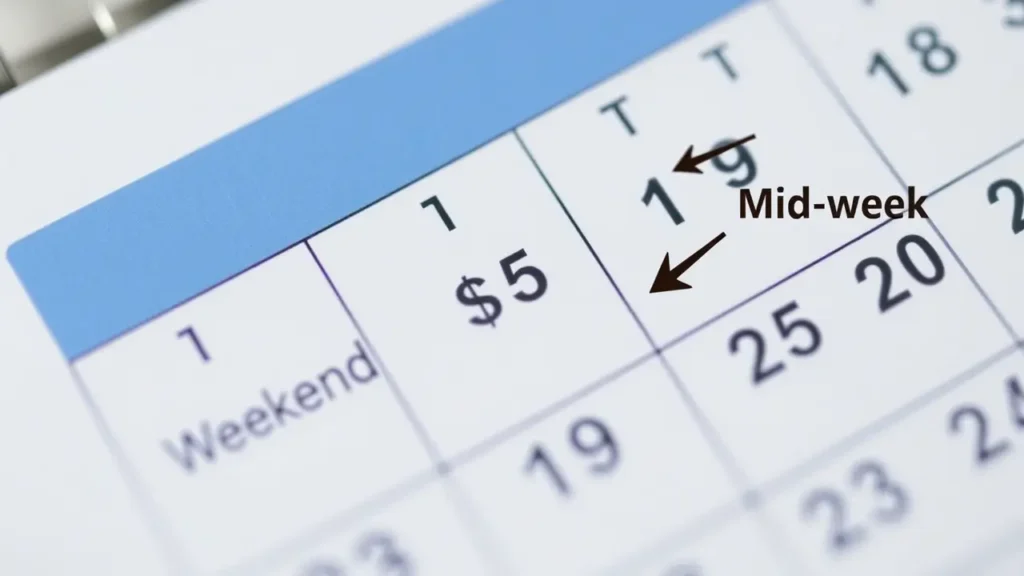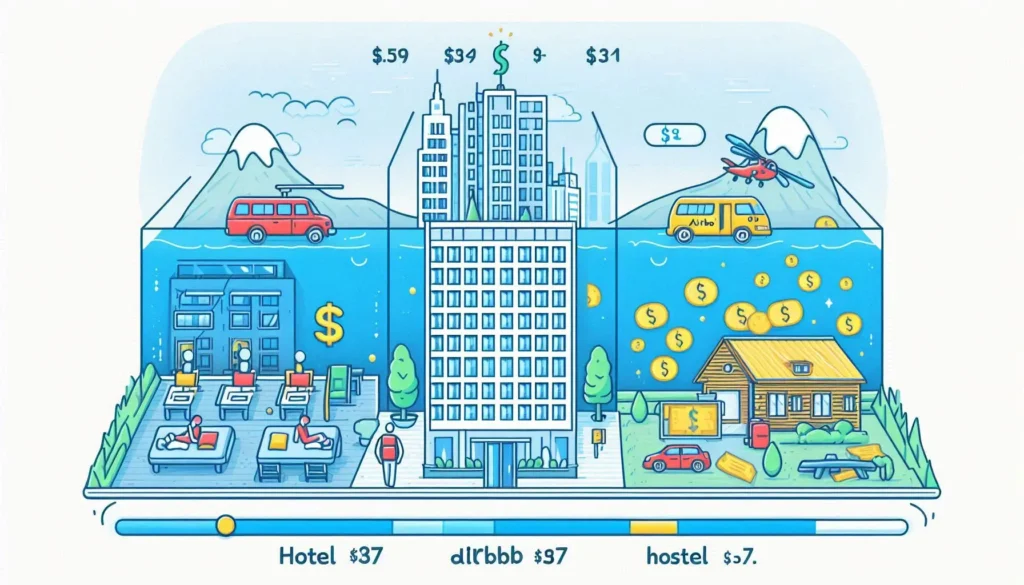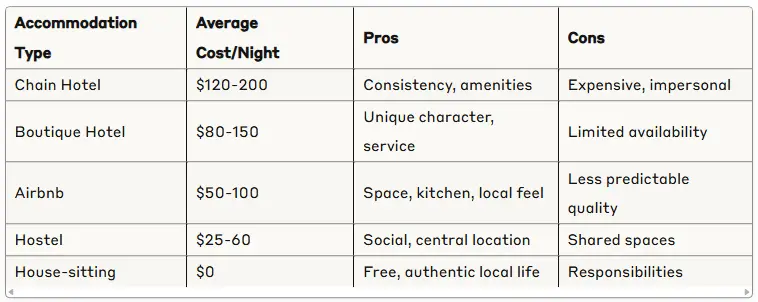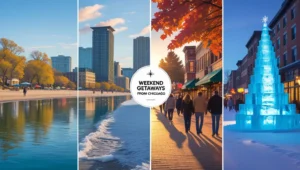It’s afternoon, you’re staring at your computer screen, and that familiar itch starts creeping in. You know the one – the need to escape, to break free from the weekly grind and dive headfirst into a mini-adventure. But then reality hits like a cold splash of water: your bank account balance.
Here’s the thing though – weekend getaways don’t have to drain your wallet faster than a leaky faucet. We’ve all been there, scrolling through Instagram, watching friends jet off to picture-perfect destinations while we’re calculating whether we can afford both gas money and coffee. But what if I told you that some of the most memorable weekend trips happen on shoestring budgets?
The secret isn’t about cutting corners until your trip resembles a sad sandwich. It’s about being smart, strategic, and maybe just a little bit rebellious against the travel industry’s attempt to convince you that good times require deep pockets.
Whether you’re planning a spontaneous road trip, a city exploration, or a nature retreat, these 15 money-saving strategies will transform you into a weekend warrior who knows how to squeeze every drop of adventure from every dollar. Ready to become the friend everyone asks for travel advice? Let’s dive in.
1. Master the Art of Flexible Travel Dates
Flexibility is your secret weapon in the battle against expensive weekend trips. While most people frantically search for Friday-to-Sunday getaways, you’ll be the clever one discovering that shifting your weekend by just a day or two can save you 30-50% on accommodations and flights.
Think about it – everyone wants to leave Friday evening and return Sunday night. This creates a supply-and-demand situation that hotels and airlines exploit mercilessly. But what happens when you leave Thursday evening and return Saturday? Or better yet, Sunday to Tuesday?
Pro tip: Use Google Flights’ calendar view to spot price patterns. You’ll often find that flying on Tuesday or Wednesday costs significantly less than Friday departures. The same principle applies to hotels – Sunday through Tuesday rates can be dramatically lower than weekend premiums.
We discovered this secret accidentally during a particularly hectic work period. What started as a necessity (we could only travel mid-week) became our preferred travel style. Mid-week destinations feel more authentic, less crowded, and significantly more affordable.

2. Embrace the Last-Minute Deal Strategy
Contrary to popular belief, last-minute bookings can be your ticket to incredible savings – if you know how to play the game. Hotels would rather fill empty rooms at discounted rates than leave them vacant, and airlines follow similar logic with unsold seats.
The key to finding last-minute deals for weekend getaways lies in using the right tools and having the right mindset. Apps like HotelTonight specialize in same-day and next-day hotel bookings, often offering rates 10-70% below standard prices.
Here’s how to make last-minute magic happen:
Download these apps immediately: Hopper for price predictions, HotelTonight for same-day deals, and Kayak for comprehensive travel searches. Set up price alerts for destinations within driving distance of your location.
Follow the 3-2-1 rule: Start monitoring prices 3 weeks out, make your decision 2 weeks before, and book 1 week ahead (or sooner for last-minute deals).
Be geographically flexible: Instead of fixating on one destination, have 3-5 options ready. When deals pop up, you’ll be prepared to pounce.
The psychology behind this strategy is simple: travel companies bank on people’s inability to make quick decisions. When you’re ready to move fast, you gain access to inventory they’re desperate to move.
3. Unlock the Power of Alternative Accommodations
Hotels aren’t your only option, and frankly, they’re often not your best option either. Alternative accommodations can cut your lodging costs by 40-80% while often providing more unique and memorable experiences.
Hostels aren’t just for college students. Modern hostels offer private rooms, excellent amenities, and built-in social networks. Hostelworld has transformed the hostel experience – you’ll find everything from pod-style accommodations in urban centers to boutique hostels in converted historic buildings.
Airbnb and vacation rentals shine for weekend trips, especially when you factor in kitchen access (hello, money-saving meal prep!) and the ability to split costs with friends. Look for properties slightly outside city centers through Airbnb or Booking.com – you’ll save money and often get more space.
House-sitting opportunities through platforms like TrustedHousesitters offer free accommodation in exchange for pet or plant care. It’s win-win: homeowners get peace of mind, and you get free lodging in residential neighborhoods where locals actually live.
Consider these unconventional options:
- University guest houses (often open to the public)
- YMCA accommodations (surprisingly nice and centrally located)
- Monastery or retreat center stays (peaceful and incredibly affordable)
- Couchsurfing (free accommodation with local insights included)


4. Become a Transportation Wizard
Transportation costs can make or break your weekend budget, but smart travelers know that the cheapest option isn’t always driving your own car. Let’s break down the real math and explore alternatives that might surprise you.
The true cost of driving includes gas, wear and tear, parking fees, and potential traffic delays. For destinations under 300 miles, driving often wins. Beyond that distance, you might find better deals elsewhere.
Bus travel has evolved dramatically. Companies like FlixBus and Megabus offer WiFi, power outlets, and comfortable seating at prices that make flying look expensive. A bus from New York to Philadelphia costs around $15-25, compared to $150+ for last-minute flights.
Train travel, particularly in the Northeast Corridor, offers a sweet spot between cost and convenience. While Amtrak tickets aren’t always cheapest, they eliminate airport hassles and often deliver you directly to city centers.
Ridesharing for longer distances through apps like BlaBlaCar (where available) or Facebook rideshare groups can cut transportation costs in half while providing interesting conversation partners.
Flight hacking strategies:
- Use Rome2Rio to compare all transportation options simultaneously
- Book connecting flights instead of direct ones (sometimes cheaper) through Google Flights
- Consider flying into secondary airports using Skyscanner for broader search options
- Use airline points strategically for weekend trips
Remember: the fastest option isn’t always the most cost-effective. That extra hour of travel time might save you $100 – money you can spend on experiences instead.
5. Eat Like a Local (Without the Tourist Markup)
Food expenses can quietly devour your weekend budget, but eating well doesn’t require dining at every restaurant recommended by travel bloggers. The secret lies in mixing strategic dining choices with smart preparation.
Grocery store tourism is a real thing, and it’s brilliant. Visiting local markets and grocery stores gives you insights into regional specialties while keeping costs down. Pick up local cheeses, bread, and fruits for impromptu picnics that often taste better than restaurant meals.
The 80/20 rule for weekend dining: Prepare or source 80% of your meals affordably, then splurge on that one special restaurant experience that defines your trip. This approach lets you experience local cuisine without blowing your budget on every meal.
Street food and food trucks often serve the most authentic local cuisine at fraction of restaurant prices. Follow the locals – if there’s a line of people speaking the local language, you’ve found gold.
Happy hour strategies extend beyond drinks. Many restaurants offer discounted appetizers and small plates during off-peak hours. You can often piece together a full meal from happy hour specials.
Meal prep for weekend trips sounds unromantic until you realize it gives you freedom to splurge on activities instead of mediocre hotel breakfast. Pack energy bars, trail mix, and instant oatmeal for quick breakfast options. A good set of leak-proof travel containers and a collapsible water bottle are weekend trip game-changers – they’ll pay for themselves after just one trip.

6. Leverage Free and Low-Cost Activities
The best weekend trip memories rarely come from expensive activities. Free and low-cost experiences often provide the most authentic glimpse into your destination while leaving money in your pocket for unexpected discoveries.
Walking tours in most cities offer incredible value. Many operate on a “pay-what-you-think-it’s-worth” model, providing professional guides and local insights for whatever you can afford. These tours often reveal hidden gems you’d never discover alone.
Museums and attractions frequently offer free or discounted admission days. Research before you travel – many major museums have free evening hours or community discount days.
Nature is the ultimate free entertainment. Hiking trails, beaches, parks, and scenic viewpoints don’t charge admission fees. Pack a lunch and spend entire days exploring outdoor spaces that cost nothing but provide priceless experiences.
Local festivals and events often coincide with weekends and provide free entertainment, food samples, and cultural experiences. Check destination event calendars when planning your trip.
City passes and attraction bundles like CityPASS can provide significant savings if you plan to visit multiple paid attractions. Do the math – these passes often pay for themselves after just two or three attractions. For activities and experiences, check Groupon for local deals that can cut attraction costs by 30-50%.
Free activity ideas for any destination:
- Self-guided architecture walks
- Beach or lake days (bring your own snacks)
- Local farmers markets (free samples and people-watching)
- University campus tours (often architecturally stunning)
- Sunset/sunrise viewing spots
- Public art installations and sculpture gardens
7. Travel During Off-Season and Shoulder Season
Timing is everything in travel, and understanding seasonal patterns can save you hundreds of dollars while often providing better experiences than peak season visits.
Off-season travel means visiting destinations when everyone else isn’t. Beach towns in October, ski resorts in summer, and European cities in winter offer dramatically reduced prices and authentic local experiences without crowds.
Shoulder season represents the sweet spot between off-season savings and decent weather. These periods – typically spring and fall – offer 30-50% savings on accommodations while maintaining pleasant conditions for exploration.
The psychology of seasonal pricing reflects basic economics: when demand drops, prices follow. Hotels, restaurants, and attractions all reduce rates to attract the smaller pool of off-season travelers.
Weather considerations matter less than you think. Many destinations offer unique charms during “unfavorable” seasons. Paris in winter feels intimate and romantic. Beach towns in shoulder season provide perfect walking weather without oppressive heat.
Research seasonal activities specific to off-season periods. You might discover festivals, local traditions, or natural phenomena that only occur during quieter months.


8. Master the Art of Strategic Booking
When you book matters as much as what you book. Understanding booking windows, price prediction algorithms, and industry patterns can save significant money on weekend trips.
The Tuesday myth isn’t entirely true, but there’s some science behind booking timing. Airlines often release sales on Monday evenings, making Tuesday morning a good time to catch new deals. However, booking 6-8 weeks in advance typically provides the best balance between selection and price for weekend trips.
Price tracking tools like Hopper and Google Flights’ price alerts take the guesswork out of timing. These tools analyze millions of data points to predict whether prices will rise or fall, letting you book with confidence.
Package deals sometimes offer genuine savings, but compare components separately first. Airlines and hotels bundle services at “discounted” rates that may not actually save money compared to booking independently.
Cancellation policies provide booking flexibility that can save money. If you find a better deal after booking, flexible cancellation lets you rebook without penalties. Many hotels offer free cancellation 24-48 hours before arrival.
Credit card booking benefits extend beyond earning points. Many travel cards offer free cancellation insurance, price matching, or automatic upgrades that add value to your bookings.
9. Embrace Group Travel Savings
Traveling with friends doesn’t just double the fun – it can halve the costs. Group travel unlocks savings opportunities unavailable to solo travelers while creating shared memories that make trips more meaningful.
Accommodation sharing provides the most obvious savings. Splitting a two-bedroom Airbnb among four people often costs less per person than individual hostel beds, while providing more space and privacy.
Transportation splitting makes expensive options affordable. That $200 Uber ride becomes $50 per person when shared among four travelers. Rental cars become cost-effective when gas and rental fees are divided.
Group discounts exist for many attractions, tours, and activities. Many tour companies offer reduced rates for groups of 4+ people. Museums and attractions often have group pricing that kicks in at surprisingly low numbers.
Bulk shopping for food and supplies reduces per-person costs while ensuring everyone has what they need. Buying snacks, drinks, and basic supplies as a group prevents expensive individual purchases throughout the trip. Consider investing in a packable travel backpack that can expand for group shopping hauls then compress for easy carrying.
Shared meal experiences let groups try expensive restaurants by ordering multiple dishes to share. This approach provides variety and authentic dining experiences at individual meal prices.
Group planning tools like Splitwise help track shared expenses and ensure fair cost distribution. Clear communication about budgets and spending expectations prevents awkward money moments during the trip.
10. Utilize Travel Rewards and Credit Card Benefits
Travel rewards credit cards can fund entire weekend trips when used strategically. The key lies in understanding how to maximize earning and redemption opportunities for short-term travel.
Sign-up bonuses on travel cards often provide enough points for multiple weekend trips. Cards like Chase Sapphire Preferred or Capital One Venture offer bonuses worth $500-750 in travel when spending requirements are met.
Category bonuses maximize everyday spending. Cards that offer extra points on dining, gas, or groceries turn routine expenses into travel funds. If you’re spending money anyway, earn points simultaneously.
Transfer partners multiply point values. Credit card points often transfer to airline and hotel programs at favorable rates, stretching your rewards further than booking through credit card portals.
Statement credits provide flexibility for non-traditional travel expenses. Many cards offer statement credits for things like rideshares, parking, or dining – expenses that occur during weekend trips but might not count as “travel” purchases.
Travel protections add value beyond rewards. Trip cancellation insurance, baggage coverage, and rental car insurance included with travel cards can save hundreds in potential fees.
Strategic spending timing maximizes bonus categories. If your card offers quarterly bonus categories, time large purchases to coincide with travel-related bonuses.

11. Explore Public Transportation Options
Public transportation isn’t just environmentally friendly – it’s often the most economical way to explore destinations while providing authentic local experiences that rental cars can’t match.
Multi-day transit passes offer significant savings in most cities. A 3-day metro pass often costs less than two days of individual rides while providing unlimited transportation freedom.
Regional transportation connects multiple destinations affordably. European rail passes, Japanese JR passes, and similar systems in other regions make multi-city weekend trips surprisingly affordable.
Transportation apps optimize public transit use. Apps like Citymapper, Moovit, and local transit apps provide real-time information, route optimization, and payment integration that make public transportation user-friendly.
Walking and cycling integration extends public transportation reach. Many cities offer bike-share programs that connect seamlessly with transit systems, creating comprehensive transportation networks at minimal cost.
Local transportation cards often include additional benefits beyond transit access. Many cards provide discounts on attractions, restaurants, or shopping, adding value beyond transportation savings.
Night transportation considerations affect weekend plans. Understanding late-night transportation options helps avoid expensive taxi rides or constrains your evening activities.
Public transportation benefits extend beyond cost savings:
- No parking hassles or fees
- Opportunity to observe local life
- Stress-free navigation (no driving in unfamiliar areas)
- Environmental benefits
- Often faster than driving in congested urban areas
12. Plan Strategic Staycations
Sometimes the best weekend trip doesn’t involve leaving your region at all. Strategic staycations can provide refreshing experiences at fraction of traditional travel costs while eliminating transportation expenses entirely.
Tourism in your own backyard often reveals surprises. Most people know less about their immediate area than distant destinations they’ve researched extensively. Approach your region with tourist eyes and discover hidden gems.
Hotel staycations during off-peak periods offer luxury experiences at steep discounts. Many hotels offer local resident rates or weekend packages that include meals, spa services, or activity credits at prices lower than typical vacation costs.
Urban exploration in nearby cities provides cultural experiences without major travel expenses. Day trips to neighboring metropolitan areas offer museum visits, architectural tours, and dining experiences accessible by short drives or train rides.
Seasonal local activities change throughout the year, providing fresh staycation options. Apple picking, wine harvesting, beach visits, hiking, and seasonal festivals create diverse experiences within driving distance.
Activity batching maximizes staycation experiences. Combine multiple activities – museum visit, special meal, outdoor activity – into cohesive weekend experiences that feel substantial without requiring distant travel.
Staycation cost breakdown compared to traditional weekend trip:

13. Use Technology and Apps for Maximum Savings
Modern technology transforms average travelers into deal-finding machines. The right apps and websites can uncover savings opportunities that manual searching would never reveal.
Price comparison aggregators like Kayak, Momondo, and Google Flights/Hotels search hundreds of booking sites simultaneously, ensuring you see the full range of available options and prices.
Prediction algorithms in apps like Hopper analyze historical price data to forecast whether current prices will rise or fall, helping you time bookings for maximum savings.
Flash sale apps like Secret Flying, Scott’s Cheap Flights (now Going), and Travelzoo alert you to mistake fares, flash sales, and limited-time deals that disappear quickly.
Currency conversion apps like XE Currency help international travelers avoid poor exchange rates and understand true costs in familiar currency. For international weekend trips, consider getting a Wise multi-currency card to avoid foreign transaction fees that can add 3% to every purchase.
Expense tracking apps during trips help maintain budget awareness and prevent overspending that negates pre-trip savings efforts.
Local discovery apps like Foursquare, Yelp, and Google Maps reveal highly-rated local businesses, often with special offers or discounts not advertised elsewhere.
Essential travel apps for budget-conscious weekend warriors:
- Booking and comparison: Kayak, Skyscanner, Rome2Rio
- Last-minute deals: HotelTonight, Booking.com Express Deals
- Transportation: Local transit apps, rideshare services
- Food: Happy Cow, Zomato, local delivery apps
- Activities: Groupon, Viator for tours
- Finance: Banking apps, Wise for international travel

14. Capitalize on Student, Senior, and Group Discounts
Age and affiliation-based discounts can slash weekend trip costs, but many travelers don’t realize the breadth of available discounts or how to access them effectively.
Student discounts extend far beyond college campuses. International Student Identity Card (ISIC) holders access discounts on transportation, accommodations, attractions, and dining worldwide. Many discounts apply to graduate students and continuing education participants too.
Senior discounts typically begin at age 50 or 55, depending on the provider. Airlines, hotels, attractions, and restaurants offer senior pricing that can reduce costs by 10-25%.
AAA membership provides travel discounts that often exceed the annual membership cost after just one trip. Hotel discounts, attraction savings, and car rental benefits make AAA membership worthwhile for frequent weekend travelers.
Military discounts for active duty, veterans, and family members are widely available but underutilized. Many businesses offer military pricing without advertising it prominently – always ask.
Professional organization discounts through unions, alumni associations, or industry groups sometimes include travel benefits. Check with your employer or professional memberships for available travel programs.
Groupon and deal sites aggregate local discounts for activities, dining, and experiences. These platforms work particularly well for weekend trips because they focus on experiences rather than just accommodations.
Discount verification strategies:
- Carry appropriate ID (student ID, military ID, etc.)
- Ask specifically – many discounts aren’t advertised
- Check online first – websites often have discount codes
- Combine discounts when possible (student + group, etc.)
15. Pre-Trip Budget Planning That Actually Works
Effective budget planning prevents overspending while ensuring you don’t miss experiences due to poor financial preparation. The goal isn’t to spend less – it’s to spend smart.
The 50/30/20 travel budget rule: Allocate 50% for transportation and accommodation (fixed costs), 30% for food and activities (flexible spending), and 20% for emergencies and unexpected opportunities.
Daily spending limits provide spending structure without killing spontaneity. Knowing you have $75 per day for food and activities helps make informed choices without constant calculator use.
Cash envelope system for weekend trips prevents overspending while simplifying expense tracking. Withdraw your budgeted amount in cash and when it’s gone, you’re done spending (except emergencies).
Emergency fund buffer of 15-20% above your planned budget covers unexpected costs without deriving your trip or forcing credit card debt.
Expense categories help track spending patterns and identify savings opportunities for future trips:

Pre-trip research helps avoid budget-busting surprises. Research typical costs for meals, transportation, and activities in your destination to set realistic expectations.
Shared expense planning for group trips prevents awkward money moments. Discuss budget expectations, payment methods, and cost-sharing arrangements before departure.
Post-trip analysis improves future budget planning. Track actual expenses against planned budget to identify patterns and improve future estimates.
Conclusion: Your Next Weekend Adventure Awaits
Here’s what we’ve learned together: saving money on weekend trips isn’t about deprivation – it’s about intelligence, creativity, and strategic thinking. Every dollar you save through smart planning is a dollar you can spend on experiences that matter.
The travelers who have the most fun aren’t necessarily the ones who spend the most money. They’re the ones who understand that authentic experiences often come from unexpected places: conversations with locals on public transportation, picnics in scenic spots, discoveries made while walking instead of taking taxis.
These 15 strategies work because they address the real costs of weekend travel while maintaining the spontaneity and joy that make short trips special. You don’t need to implement all of them simultaneously. Start with three or four that resonate with your travel style and gradually incorporate others as you become more comfortable with budget-conscious travel.
Remember, the goal isn’t to become a travel miser – it’s to become a travel optimizer. Every strategy you master gives you more freedom to say “yes” to adventures, more opportunities to explore, and more money to invest in the experiences that create lasting memories.
Your next weekend adventure is calling. With these tools in your arsenal, the only question left is: where will you go first?
Ready to put these money-saving strategies into action? Start planning your next budget-friendly weekend getaway today. Share your favorite money-saving travel tip in the comments below – we’d love to hear how you make the most of your weekend adventures without breaking the bank.
What’s your biggest challenge when planning budget-friendly weekend trips? Let us know, and we’ll help you tackle it in future guides.
Affiliate Disclosure: This post contains affiliate links to products and services we recommend. If you purchase through these links, we may earn a small commission at no additional cost to you. We only recommend products we’ve personally used or thoroughly researched. Your support helps us create more helpful travel content.







One Response